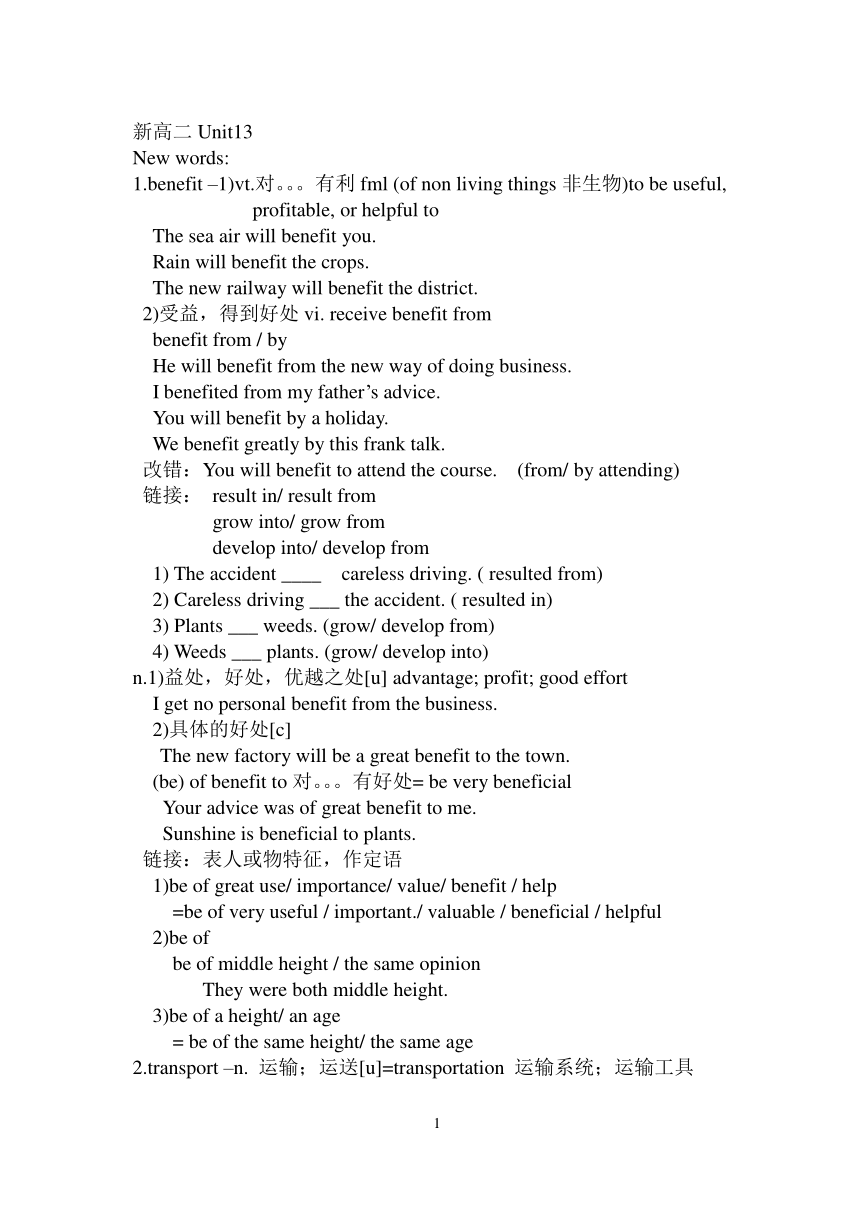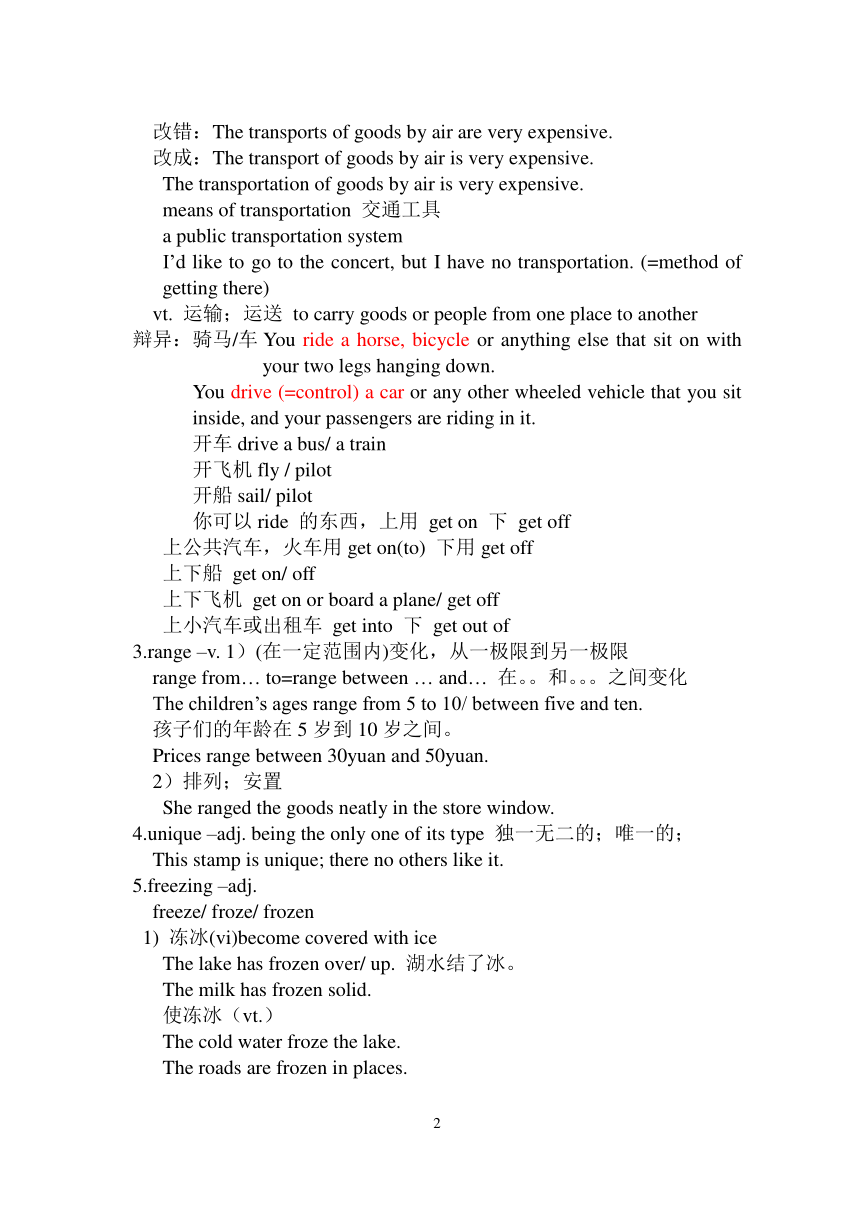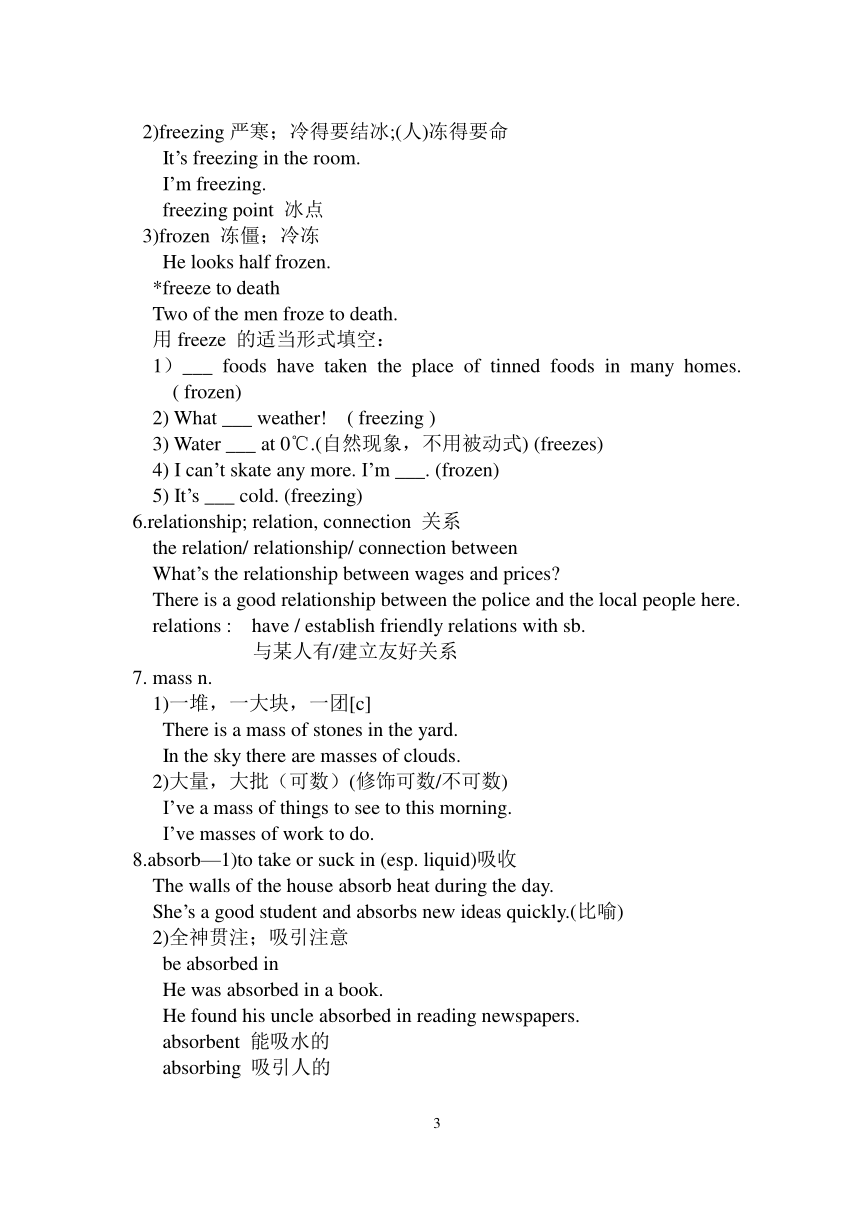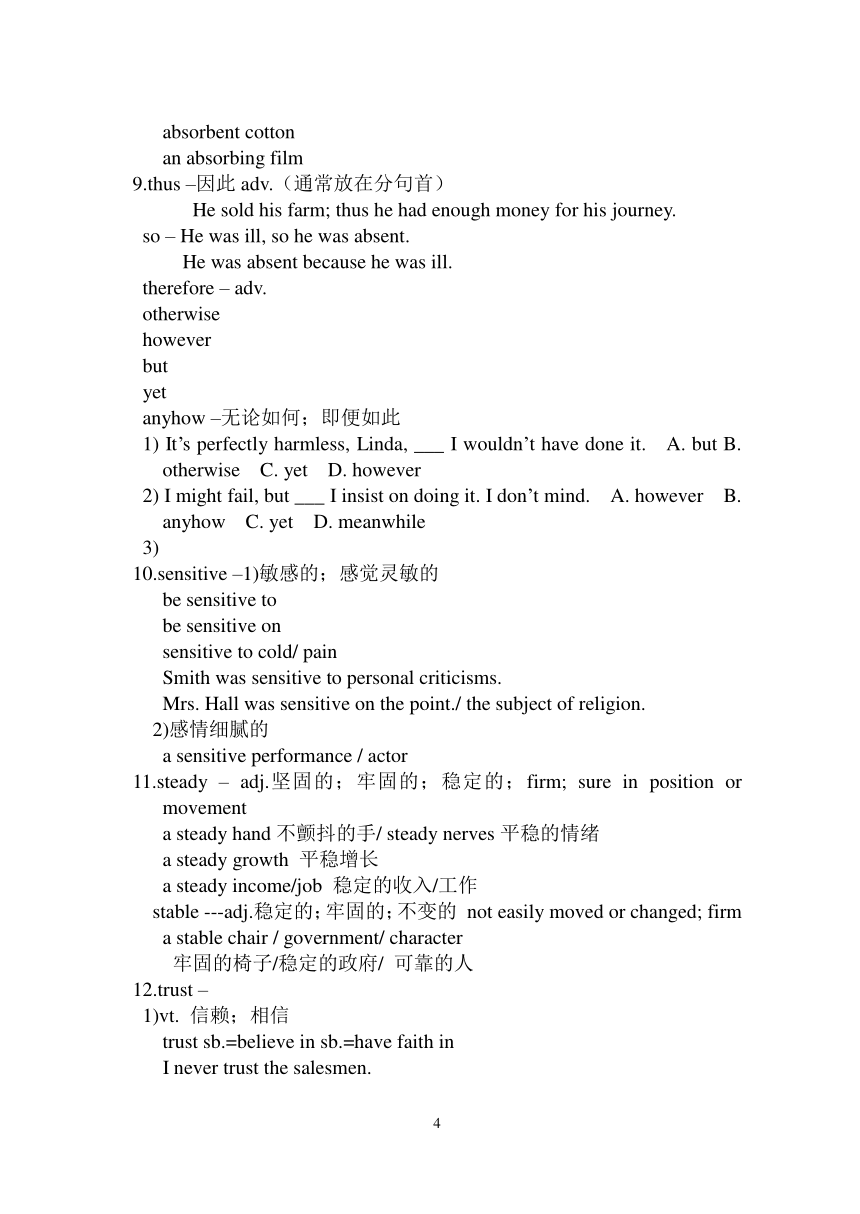高二unit13教案[下学期]
图片预览




文档简介
新高二Unit13
New words:
1.benefit –1)vt.对。。。有利fml (of non living things非生物)to be useful,
profitable, or helpful to
The sea air will benefit you.
Rain will benefit the crops.
The new railway will benefit the district.
2)受益,得到好处vi. receive benefit from
benefit from / by
He will benefit from the new way of doing business.
I benefited from my father’s advice.
You will benefit by a holiday.
We benefit greatly by this frank talk.
改错:You will benefit to attend the course. (from/ by attending)
链接: result in/ result from
grow into/ grow from
develop into/ develop from
1) The accident ____ careless driving. ( resulted from)
2) Careless driving ___ the accident. ( resulted in)
3) Plants ___ weeds. (grow/ develop from)
4) Weeds ___ plants. (grow/ develop into)
n.1)益处,好处,优越之处[u] advantage; profit; good effort
I get no personal benefit from the business.
2)具体的好处[c]
The new factory will be a great benefit to the town.
(be) of benefit to对。。。有好处= be very beneficial
Your advice was of great benefit to me.
Sunshine is beneficial to plants.
链接:表人或物特征,作定语
1)be of great use/ importance/ value/ benefit / help
=be of very useful / important./ valuable / beneficial / helpful
2)be of
be of middle height / the same opinion
They were both middle height.
3)be of a height/ an age
= be of the same height/ the same age
2.transport –n. 运输;运送[u]=transportation 运输系统;运输工具
改错:The transports of goods by air are very expensive.
改成:The transport of goods by air is very expensive.
The transportation of goods by air is very expensive.
means of transportation 交通工具
a public transportation system
I’d like to go to the concert, but I have no transportation. (=method of getting there)
vt. 运输;运送 to carry goods or people from one place to another
辩异:骑马/车You ride a horse, bicycle or anything else that sit on with your two legs hanging down.
You drive (=control) a car or any other wheeled vehicle that you sit inside, and your passengers are riding in it.
开车drive a bus/ a train
开飞机fly / pilot
开船sail/ pilot
你可以ride 的东西,上用 get on 下 get off
上公共汽车,火车用get on(to) 下用get off
上下船 get on/ off
上下飞机 get on or board a plane/ get off
上小汽车或出租车 get into 下 get out of
3.range –v. 1)(在一定范围内)变化,从一极限到另一极限
range from… to=range between … and… 在。。和。。。之间变化
The children’s ages range from 5 to 10/ between five and ten.
孩子们的年龄在5岁到10岁之间。
Prices range between 30yuan and 50yuan.
2)排列;安置
She ranged the goods neatly in the store window.
4.unique –adj. being the only one of its type 独一无二的;唯一的;
This stamp is unique; there no others like it.
5.freezing –adj.
freeze/ froze/ frozen
1) 冻冰(vi)become covered with ice
The lake has frozen over/ up. 湖水结了冰。
The milk has frozen solid.
使冻冰(vt.)
The cold water froze the lake.
The roads are frozen in places.
2)freezing严寒;冷得要结冰;(人)冻得要命
It’s freezing in the room.
I’m freezing.
freezing point 冰点
3)frozen 冻僵;冷冻
He looks half frozen.
*freeze to death
Two of the men froze to death.
用freeze 的适当形式填空:
1)___ foods have taken the place of tinned foods in many homes. ( frozen)
2) What ___ weather! ( freezing )
3) Water ___ at 0℃.(自然现象,不用被动式) (freezes)
4) I can’t skate any more. I’m ___. (frozen)
5) It’s ___ cold. (freezing)
6.relationship; relation, connection 关系
the relation/ relationship/ connection between
What’s the relationship between wages and prices
There is a good relationship between the police and the local people here.
relations : have / establish friendly relations with sb.
与某人有/建立友好关系
7. mass n.
1)一堆,一大块,一团[c]
There is a mass of stones in the yard.
In the sky there are masses of clouds.
2)大量,大批(可数)(修饰可数/不可数)
I’ve a mass of things to see to this morning.
I’ve masses of work to do.
8.absorb—1)to take or suck in (esp. liquid)吸收
The walls of the house absorb heat during the day.
She’s a good student and absorbs new ideas quickly.(比喻)
2)全神贯注;吸引注意
be absorbed in
He was absorbed in a book.
He found his uncle absorbed in reading newspapers.
absorbent 能吸水的
absorbing 吸引人的
absorbent cotton
an absorbing film
9.thus –因此adv.(通常放在分句首)
He sold his farm; thus he had enough money for his journey.
so – He was ill, so he was absent.
He was absent because he was ill.
therefore – adv.
otherwise
however
but
yet
anyhow –无论如何;即便如此
1) It’s perfectly harmless, Linda, ___ I wouldn’t have done it. A. but B. otherwise C. yet D. however
2) I might fail, but ___ I insist on doing it. I don’t mind. A. however B. anyhow C. yet D. meanwhile
3)
10.sensitive –1)敏感的;感觉灵敏的
be sensitive to
be sensitive on
sensitive to cold/ pain
Smith was sensitive to personal criticisms.
Mrs. Hall was sensitive on the point./ the subject of religion.
2)感情细腻的
a sensitive performance / actor
11.steady – adj.坚固的;牢固的;稳定的;firm; sure in position or movement
a steady hand不颤抖的手/ steady nerves平稳的情绪
a steady growth 平稳增长
a steady income/job 稳定的收入/工作
stable ---adj.稳定的;牢固的;不变的 not easily moved or changed; firm
a stable chair / government/ character
牢固的椅子/稳定的政府/ 可靠的人
12.trust –
1)vt. 信赖;相信
trust sb.=believe in sb.=have faith in
I never trust the salesmen.
2)trust in 对。。。有信心,信奉
You must trust in your own judgment.
Do you trust in God
3)托付;委托
trust sb. with sth. =trust sth. to sb.
I trust him with my watch.=I trust my watch to him.
4) n. have trust in 相信
in one’s trust 照顾;托管
The child was left in her trust.
13.1)a variety of (单;复)
There are a variety of apples in the shop.
There is a variety of fruit in the shop.
A variety of apples have been carried here.
The variety of apples is astonishing.苹果的品种令人吃惊。
2) various adj. different
There are various ways of working out the problem.
3)varied –adj. of different kinds
Opinions on the play were varied.
4) vary –v. become different
Opinions on the matter vary.
Text:
1.Life in the oceans ranges from the tiniest plankton all the way up to giants like sharks and whales.
海洋里有最小的浮游植物一直到像鲨鱼和鲸鱼这样的庞然大物。
range from.. to 从。。。到。。。不等,在一定范围(程度)内变化
Prices ranged from 5 to 10 dollars.
all the way 一直,始终
Jack climbed all the way to the top of the tree.
All the way back, they talked about films and actors.
up to 1)到(某个数量)
He counted up to a hundred.
The lift will hold up to three people.
链接:be up to (打算)做某事(不好的事 )
What have you been up to now
He knew that Tom was up to something.
be up to sb.( to do) 由某人做某事,由某人决定
It’s up to me to tell her about it.
The choice is up to you.
When you do it is up to you.
2.medium –n. 1)生存环境;生活条件,(力的)媒介
A fish in water is in its natural medium.鱼在水中是在自然环境中。
Sound travels through the medium of air.
声音是通过空气这一媒介传送。
2)传播媒介;艺术形式 media;手段;方式
Letters are a medium of communication.
Television can be an excellent medium for education.
Television can be a medium for giving information, for amusing people, and for teaching them. 电视可以是一种提供信息,娱乐和教育观众的媒介。
3. The nutrients in whatever falls into the ocean will quickly become available to other living creatures.任何落入海洋里的物质中的营养物很快被其他生物所吸收利用的。
1)whatever=anything that…, everything that…
You can eat whatever you like.
Whatever is left over is yours.
Talk to me about whatever is troubling you.
Don’t you know that she always succeeds in whatever she tries
whatever= no matter what
Whatever happens, we’ll meet here tonight.
2)available a)can be used or obtained by…可用的,可得到的
Chinese commodities available for export are varied.
中国可供出口的商品种类繁多。
I’m sorry, those overcoats are not available in your size.
对不起,这种外套没有你要的尺码。
Attention, please. These tickets are available in (the) day of issue only. 请注意,这种票仅在发售当日可以买到。
b)可会见的;可与之交谈的 = free to be seen or talked to
Is the manager available 经理在不在?
The lawyer is not available now. 律师现在不在(没空)。
4.The salinity of the earth’s oceans is about thirty-five parts per thousand, meaning that there are about thirty-five grams of dissolved solids and gases in one kilogram of water.地球海洋里的盐度大约为35‰,这就是说,在每公斤的水中约含有35克溶解的固体和气体。
,meaning that... 这就是说。。。
The density of pure water is 1,000 kg/㎡, meaning that one cubic meter of water weighs one thousand kilograms. 意思是说。。。
5.If a substance has a higher density, say 5,000kg/m3, it will not float on water.
say设想,假定,比方说=suppose as an example or a possibility)
Let’s say that you’re right.
Say you have an accident, who would you look after you
Let’s take any writer, say(=for example) Dickens…
You could learn to play chess in, (let’s) say, three months.
suppose—假定
Let us suppose for a moment that what you say is true.
Let’s suppose we each had $100 to spend—what would we buy with it
还可作连词:
Suppose your father saw you what would he say
Suppose/ supposing your friends knew how you’re behaving here, what would they think
6.Heat capacity is the amount of energy it takes to raise the temperature of a substance one degree centigrade.热容量是指将一种物质的温度升高一摄氏度所需的能量。
7.give off散发出
The gas gave off an unpleasant smell.
The flowers gave off a sweet fragrance.
The engine gives off smoke and steam.
send out 发出(光亮等)
The sun sends out light and heat.
This lamp sends out a powerful beam.
8.Water can absorb and give off a lot of heat without big changes in temperature, thus creating a stable environment.
thus—adv. 因此;从而,于是(后常跟现在分词短语,作结果状语)
Estuaries are also important because they absorb nutrients and pollutants from water coming from inland sources, thus cleaning our water.河流的入海口也很重要,因为他们吸收流自内陆的水中的营养物和污染物,从而达到净化水的目的。
PAGE
7
New words:
1.benefit –1)vt.对。。。有利fml (of non living things非生物)to be useful,
profitable, or helpful to
The sea air will benefit you.
Rain will benefit the crops.
The new railway will benefit the district.
2)受益,得到好处vi. receive benefit from
benefit from / by
He will benefit from the new way of doing business.
I benefited from my father’s advice.
You will benefit by a holiday.
We benefit greatly by this frank talk.
改错:You will benefit to attend the course. (from/ by attending)
链接: result in/ result from
grow into/ grow from
develop into/ develop from
1) The accident ____ careless driving. ( resulted from)
2) Careless driving ___ the accident. ( resulted in)
3) Plants ___ weeds. (grow/ develop from)
4) Weeds ___ plants. (grow/ develop into)
n.1)益处,好处,优越之处[u] advantage; profit; good effort
I get no personal benefit from the business.
2)具体的好处[c]
The new factory will be a great benefit to the town.
(be) of benefit to对。。。有好处= be very beneficial
Your advice was of great benefit to me.
Sunshine is beneficial to plants.
链接:表人或物特征,作定语
1)be of great use/ importance/ value/ benefit / help
=be of very useful / important./ valuable / beneficial / helpful
2)be of
be of middle height / the same opinion
They were both middle height.
3)be of a height/ an age
= be of the same height/ the same age
2.transport –n. 运输;运送[u]=transportation 运输系统;运输工具
改错:The transports of goods by air are very expensive.
改成:The transport of goods by air is very expensive.
The transportation of goods by air is very expensive.
means of transportation 交通工具
a public transportation system
I’d like to go to the concert, but I have no transportation. (=method of getting there)
vt. 运输;运送 to carry goods or people from one place to another
辩异:骑马/车You ride a horse, bicycle or anything else that sit on with your two legs hanging down.
You drive (=control) a car or any other wheeled vehicle that you sit inside, and your passengers are riding in it.
开车drive a bus/ a train
开飞机fly / pilot
开船sail/ pilot
你可以ride 的东西,上用 get on 下 get off
上公共汽车,火车用get on(to) 下用get off
上下船 get on/ off
上下飞机 get on or board a plane/ get off
上小汽车或出租车 get into 下 get out of
3.range –v. 1)(在一定范围内)变化,从一极限到另一极限
range from… to=range between … and… 在。。和。。。之间变化
The children’s ages range from 5 to 10/ between five and ten.
孩子们的年龄在5岁到10岁之间。
Prices range between 30yuan and 50yuan.
2)排列;安置
She ranged the goods neatly in the store window.
4.unique –adj. being the only one of its type 独一无二的;唯一的;
This stamp is unique; there no others like it.
5.freezing –adj.
freeze/ froze/ frozen
1) 冻冰(vi)become covered with ice
The lake has frozen over/ up. 湖水结了冰。
The milk has frozen solid.
使冻冰(vt.)
The cold water froze the lake.
The roads are frozen in places.
2)freezing严寒;冷得要结冰;(人)冻得要命
It’s freezing in the room.
I’m freezing.
freezing point 冰点
3)frozen 冻僵;冷冻
He looks half frozen.
*freeze to death
Two of the men froze to death.
用freeze 的适当形式填空:
1)___ foods have taken the place of tinned foods in many homes. ( frozen)
2) What ___ weather! ( freezing )
3) Water ___ at 0℃.(自然现象,不用被动式) (freezes)
4) I can’t skate any more. I’m ___. (frozen)
5) It’s ___ cold. (freezing)
6.relationship; relation, connection 关系
the relation/ relationship/ connection between
What’s the relationship between wages and prices
There is a good relationship between the police and the local people here.
relations : have / establish friendly relations with sb.
与某人有/建立友好关系
7. mass n.
1)一堆,一大块,一团[c]
There is a mass of stones in the yard.
In the sky there are masses of clouds.
2)大量,大批(可数)(修饰可数/不可数)
I’ve a mass of things to see to this morning.
I’ve masses of work to do.
8.absorb—1)to take or suck in (esp. liquid)吸收
The walls of the house absorb heat during the day.
She’s a good student and absorbs new ideas quickly.(比喻)
2)全神贯注;吸引注意
be absorbed in
He was absorbed in a book.
He found his uncle absorbed in reading newspapers.
absorbent 能吸水的
absorbing 吸引人的
absorbent cotton
an absorbing film
9.thus –因此adv.(通常放在分句首)
He sold his farm; thus he had enough money for his journey.
so – He was ill, so he was absent.
He was absent because he was ill.
therefore – adv.
otherwise
however
but
yet
anyhow –无论如何;即便如此
1) It’s perfectly harmless, Linda, ___ I wouldn’t have done it. A. but B. otherwise C. yet D. however
2) I might fail, but ___ I insist on doing it. I don’t mind. A. however B. anyhow C. yet D. meanwhile
3)
10.sensitive –1)敏感的;感觉灵敏的
be sensitive to
be sensitive on
sensitive to cold/ pain
Smith was sensitive to personal criticisms.
Mrs. Hall was sensitive on the point./ the subject of religion.
2)感情细腻的
a sensitive performance / actor
11.steady – adj.坚固的;牢固的;稳定的;firm; sure in position or movement
a steady hand不颤抖的手/ steady nerves平稳的情绪
a steady growth 平稳增长
a steady income/job 稳定的收入/工作
stable ---adj.稳定的;牢固的;不变的 not easily moved or changed; firm
a stable chair / government/ character
牢固的椅子/稳定的政府/ 可靠的人
12.trust –
1)vt. 信赖;相信
trust sb.=believe in sb.=have faith in
I never trust the salesmen.
2)trust in 对。。。有信心,信奉
You must trust in your own judgment.
Do you trust in God
3)托付;委托
trust sb. with sth. =trust sth. to sb.
I trust him with my watch.=I trust my watch to him.
4) n. have trust in 相信
in one’s trust 照顾;托管
The child was left in her trust.
13.1)a variety of (单;复)
There are a variety of apples in the shop.
There is a variety of fruit in the shop.
A variety of apples have been carried here.
The variety of apples is astonishing.苹果的品种令人吃惊。
2) various adj. different
There are various ways of working out the problem.
3)varied –adj. of different kinds
Opinions on the play were varied.
4) vary –v. become different
Opinions on the matter vary.
Text:
1.Life in the oceans ranges from the tiniest plankton all the way up to giants like sharks and whales.
海洋里有最小的浮游植物一直到像鲨鱼和鲸鱼这样的庞然大物。
range from.. to 从。。。到。。。不等,在一定范围(程度)内变化
Prices ranged from 5 to 10 dollars.
all the way 一直,始终
Jack climbed all the way to the top of the tree.
All the way back, they talked about films and actors.
up to 1)到(某个数量)
He counted up to a hundred.
The lift will hold up to three people.
链接:be up to (打算)做某事(不好的事 )
What have you been up to now
He knew that Tom was up to something.
be up to sb.( to do) 由某人做某事,由某人决定
It’s up to me to tell her about it.
The choice is up to you.
When you do it is up to you.
2.medium –n. 1)生存环境;生活条件,(力的)媒介
A fish in water is in its natural medium.鱼在水中是在自然环境中。
Sound travels through the medium of air.
声音是通过空气这一媒介传送。
2)传播媒介;艺术形式 media;手段;方式
Letters are a medium of communication.
Television can be an excellent medium for education.
Television can be a medium for giving information, for amusing people, and for teaching them. 电视可以是一种提供信息,娱乐和教育观众的媒介。
3. The nutrients in whatever falls into the ocean will quickly become available to other living creatures.任何落入海洋里的物质中的营养物很快被其他生物所吸收利用的。
1)whatever=anything that…, everything that…
You can eat whatever you like.
Whatever is left over is yours.
Talk to me about whatever is troubling you.
Don’t you know that she always succeeds in whatever she tries
whatever= no matter what
Whatever happens, we’ll meet here tonight.
2)available a)can be used or obtained by…可用的,可得到的
Chinese commodities available for export are varied.
中国可供出口的商品种类繁多。
I’m sorry, those overcoats are not available in your size.
对不起,这种外套没有你要的尺码。
Attention, please. These tickets are available in (the) day of issue only. 请注意,这种票仅在发售当日可以买到。
b)可会见的;可与之交谈的 = free to be seen or talked to
Is the manager available 经理在不在?
The lawyer is not available now. 律师现在不在(没空)。
4.The salinity of the earth’s oceans is about thirty-five parts per thousand, meaning that there are about thirty-five grams of dissolved solids and gases in one kilogram of water.地球海洋里的盐度大约为35‰,这就是说,在每公斤的水中约含有35克溶解的固体和气体。
,meaning that... 这就是说。。。
The density of pure water is 1,000 kg/㎡, meaning that one cubic meter of water weighs one thousand kilograms. 意思是说。。。
5.If a substance has a higher density, say 5,000kg/m3, it will not float on water.
say设想,假定,比方说=suppose as an example or a possibility)
Let’s say that you’re right.
Say you have an accident, who would you look after you
Let’s take any writer, say(=for example) Dickens…
You could learn to play chess in, (let’s) say, three months.
suppose—假定
Let us suppose for a moment that what you say is true.
Let’s suppose we each had $100 to spend—what would we buy with it
还可作连词:
Suppose your father saw you what would he say
Suppose/ supposing your friends knew how you’re behaving here, what would they think
6.Heat capacity is the amount of energy it takes to raise the temperature of a substance one degree centigrade.热容量是指将一种物质的温度升高一摄氏度所需的能量。
7.give off散发出
The gas gave off an unpleasant smell.
The flowers gave off a sweet fragrance.
The engine gives off smoke and steam.
send out 发出(光亮等)
The sun sends out light and heat.
This lamp sends out a powerful beam.
8.Water can absorb and give off a lot of heat without big changes in temperature, thus creating a stable environment.
thus—adv. 因此;从而,于是(后常跟现在分词短语,作结果状语)
Estuaries are also important because they absorb nutrients and pollutants from water coming from inland sources, thus cleaning our water.河流的入海口也很重要,因为他们吸收流自内陆的水中的营养物和污染物,从而达到净化水的目的。
PAGE
7
